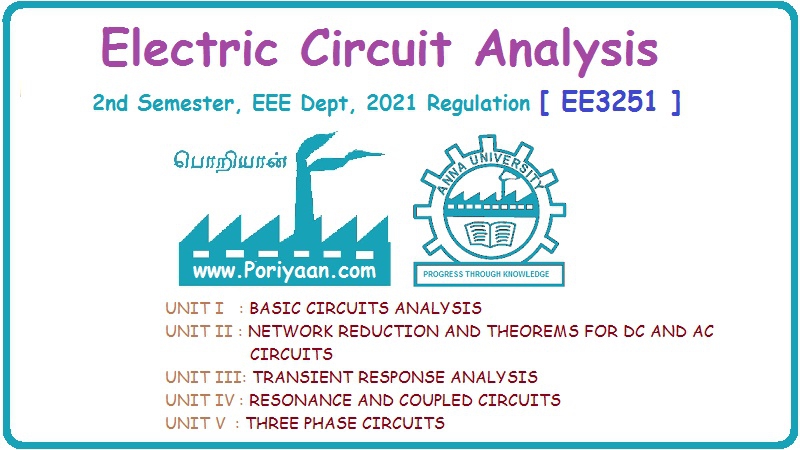Electric Circuit Analysis: Two Mark Question and Answers
Two Mark Question and Answers set - 1
Electric Circuit Analysis
Electric Circuit Analysis: Two Mark Question and Answers
TWO MARK QUESTION AND ANSWERS
1.
Name different network elements.
Ans
: (a) Active elements like voltage source and current
source.
(b)
Passive elements like resistor, inductor and capacitor.
2.
State Ohm's law.
Ans:
The ratio of the voltage across to the current through the conductor remains
constant, for a constant temperature. This constant is known as resistance of
the conductor.
Mathematically,
V/I = constant = R
3.
Write Kirchhoff's laws mathematically.
Ans:
KCL: At electrical node, ΣI = 0
KVL:
In any closed loop, Σemf + ΣIR = 0
4.
State two salient points for a series combination of resistors.
Ans:
i. Current is same and voltage is distributed
ii.
The total resistance is greater than the individual resistance.
5.
State two salient points for parallel combination of resistors.
Ans:
i. Voltage is same across all individual resistance
ii.
Current is divided, inversely proportional to the resistors
iii.
The total resistance is less than the least.
6.
Give two applications of both series combination and parallel combination.
Ans:
For series combination :
a.
A fan regulator connected in series with the fan.
b.
Decoration lights.
For
parallel combination
a.
Electrical wiring in cinema halls
b.
House wiring
7.
A bulb is rated as 230V, 230W. Find the rated current, resistance of the
filament and the energy consumed when it is operated for 10 hours.
Ans:
Rated current = Power / voltage = 230/230 = 1 A
Resistance
of the filament R= V/I = 230/1 = 230Ω
Energy
consumed = Power x time = 230 × 10
=
2300 Wh = 2.3 KWh
=
2.3 Units
8.
At a node there are 3 live conductors joining. The currents flowing in two
conductors towards the node are 1A and 2A. What is the direction and magnitude
of the current in the third conductor.
Ans:
At
a junction, KCL can be stated as below also Sum of incoming currents = Sum of
outgoing currentsore e bomen que eobon od Tank
Here,
1+2 = Outgoing current.
In
other words the current through the third conductor is 3 A flowing away from
the node.
9.
In a closed loop the algebraic sum of the elective motive forces is 10V. What
is the voltage drop across resistors in that loop?
Ans:
According to KVL, in any closed loop, Σemf + ΣIR = 0
⇒ 10 + ΣIR = 0
⇒ EIR = -10
The
voltage drop across the resistors = 10V.
10.
Given that the resistors Ra, R & R are connected electrically in star.
Write the equations for resistors in equivalent delta.
Ans
:
Rab
= Ra + Rb + RaRb/Rc
Rbc
= Rb +Rc + RьRc/Ra
Rca
Rc + Ra + RcRa/Rb
11.
Three equal resistors each of R ohms are connected in star. Find the values of
resistors in the equivalent delta.
Ans:
Rab = Rbc = Rca = 3R
12.
Three resistors Rab, Rbc & Rca are
connected in delta. Write the expression for resistors in equivalent star.
Ans
:

13.
Three resistors, each of value R ohms are connected in delta. Find the value of
resistors in its equivalent star.
Ans:
Ra = Rb Rc = R/3
14.
Write the Kirchhoff's voltage law.
Ans:
The algebraic sum of electromotive forces plus the algebraic sum of voltages
across impedances, in any closed circuit is equal to zero.
i.e.,
Σ emf+E IZ = 0, in any closed circuit.
15.
For the circuit shown, write the nodal equations in the matrix form.
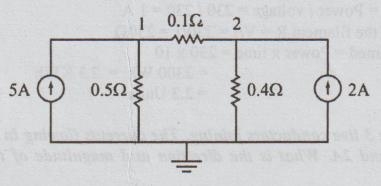
Ans:
The nodes are named as shown in the given figure. Node 3 is taken as reference.
In the matrix form, the nodal equations are:
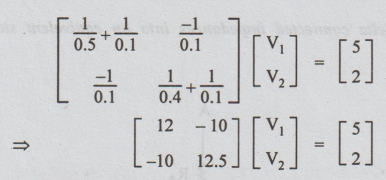
16.
Define an ideal voltage source.
Ans:
For an ideal voltage source, source impedance is zero. Such voltage source
gives a constant voltage V irrespective of current drawn from it.
17.
Define an ideal current source.
Ans:
For an ideal current source, source impedance is infinite. Such an ideal
current source gives a constant current irrespective of voltage across it.
18.
Draw the symbolic representation of the voltage source and current source.
Ans:

19.
Explain how voltage source with a source resistance can be converted into an
equivalent current source.
Ans:
Let the voltage source have a voltage of V volts and resistance of R. R is in
series with source. Its equivalent current source will have a current I in
parallel with resistance R. Here,
I
= V / R

20.
Find the equivalent current source for a voltage source of 100 volts with
series resistance of 22
Ans:

21.
Write the expression for converting delta connected impedances into an
equivalent star connected impedances.
Ans
:
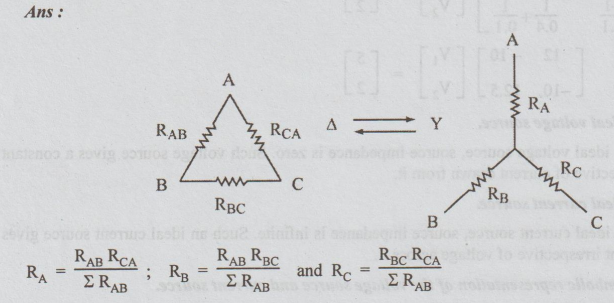
22. If all the three star connected impedances are identical and equal to Z, what are the delta equivalent impedances?
Ans:
Let
ZA = ZB = ZC = Z
Then
ZAB = ZBC = ZCA = 3Z
23.
Three resistors 102, 52 and 202 are connected in star. What are the equivalent
delta resistors.
Ans
:
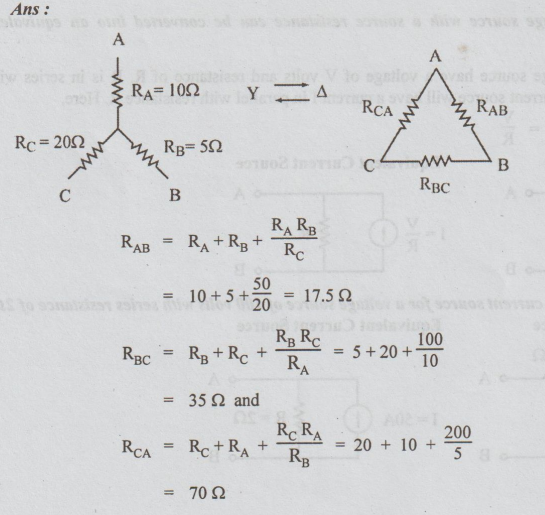
24.
Each of the three arms of a delta connected network has resistance of 32 Find
the equivalent star connected network.
Ans:
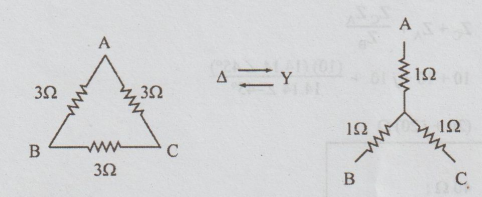
25.
A Y-connected resistive network consists of 252 in each arm. Draw the
equivalent delta- connected network and insert the values.
Ans:
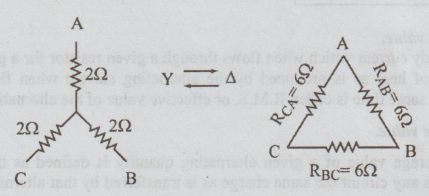
Electric Circuit Analysis: Two Mark Question and Answers : Tag: : Electric Circuit Analysis - Two Mark Question and Answers set - 1
Related Topics
Related Subjects
Electric Circuit Analysis
EE3251 2nd Semester 2021 Regulation | 2nd Semester EEE Dept 2021 Regulation
